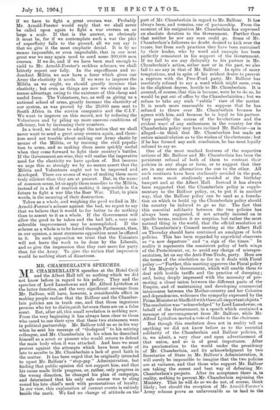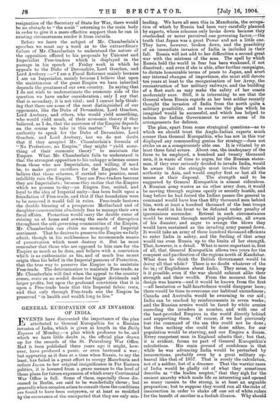M R. CHAMBERLAIN'S speeches at the Hotel Cecil and the Albert
Hall tell us nothing which we did not know before in regard to his policy. They and the speeches of Lord Lansdowne and Mr. Alfred Lyttelton at the latter function, and the very significant message from Mr. Balfour, will have, however, a considerable effect in making people realise that the Balfour and the Chamber- lain policies are in truth one, and that those ingenious persons who try to distinguish between them are on a false scent. But, after all, this small revelation is nothing new. From the very beginning it has always been clear to those who cared to.use their eyes that these two statesmen were in political partnership. Mr. Balfour told us so in his way when he sent his message of "Godspeed" to his retiring colleague, and Mr. Chamberlain in his when he described himself as a scout or pioneer who would return to defend the main body when it was attacked. And here we must protest against the attempts which have been made of late to ascribe to Mr. Chamberlain a lack of good faith in the matter. It has been urged that he originally intended to upset Mr. Balfour's " stop-gap " Administration, but finding that public opinion did not support him, and that his cause made little progress, or, rather, only progress in the wrong direction, he changed his plan of campaign, and determined that his only safe course was to cling round his late chief's neck with protestations of loyalty. In our view, this explanation of current events is entirely beside the mark. We find no change of attitude on the part of Mr. Chamberlain in regard to Mr. Balfour. It has always been, and remains, one of partnership. From the moment of his resignation Mr. Chamberlain has expressed an absolute devotion to the Government. Further than that neither he nor any man could go. Some of Mr. Chamberlain's followers no doubt desired to kick over the traces, but from such practices they have been restrained by their leader, who by word and example has been perfectly consistent in his support of the Government. If we fail to see any disloyalty to his partner in Mr. Chamberlain's action, either now or in the past, we also fail to see any in that of Mr. Balfour. In spite of many temptations, and in spite of his evident desire to prevent a rupture with the Free-Food party, Mr. Balfour has resolutely refused to say a word which might seem, even in the slightest degree, hostile to Mr. Chamberlain. It is averred, of course, that this is because, were he to do so, he would be put out of office by the Chamberlainites ; but we refuse to take any such " subtle " view of the matter. It is much more reasonable to suppose that he has refused to throw over Mr. Chamberlain because he agrees with him, and because he is loyal to his partner. Very possibly the course of the by-elections and the evident want of any enthusiasm in the country for the Chamberlain policy may have inclined Mr. Balfour—as is alleged—to think that Mr. Chamberlain has made an entire miscalculation as to the wishes of the electorate ; but if he has formed any such conclusion, he has most loyally refused to say so.
One of the most marked features of the respective actions of Mr. Balfour and Mr. Chamberlain has been the persistent refusal of both of them to contrast their policies in any shape or form, or to suggest that they are in any sense alternatives the one to the other. All such contrasts have been studiously avoided in the past, and were most studiously avoided at the birthday banquet and at the Albert Hall. Instead it has always been suggested that the Chamberlain policy is supple- mentary to the Balfour policy, or, to put it in another way, that the Balfour policy can be used as a founda- tion on which to build up the Chamberlain policy should the country be induced to go so far. The fact that this essential solidarity between the two policies has always been suggested, if not actually insisted on in specific terms, renders it no surprise, but rather the most natural thing in the world, that the official resolution at Mr. Chamberlain's Council meeting at the Albert Hall on Thursday should have contained an amalgam of both policies. This has been regarded by superficial observers as "a new departure" and "a sign of the times." In reality it represents the consistent policy of both wings of the Protectionist, or, to avoid any charge of misrepre- sentation, let us say the Anti-Free-Trade, party. Here are the terms of the resolution as far as it deals with Fiscal policy :—" Further, this meeting approves the Fiscal policy of his Majesty's Government, which will enable them to deal with hostile tariffs and the practice of dumping ; and, being deeply impressed with the necessity of pro- moting a closer union between the different parts of the Empire, and of maintaining and developing commercial intercourse between the Mother-country and her Colonies and dependencies, welcomes the sympathy expressed by the Prime Minister at Sheffield with these all-important objects." The resolution was "acknowledged" by Lord Lansdowne, on behalf of the Government, in a speech which contained a, message of encouragement from Mr. Balfour, while Mr. Alfred Lyttelton moved a vote of thanks to the chairman.
But though this resolution does not in reality tell us anything we did not know before as to the essential solidarity of the Chamberlain and Balfour policies, it is, we admit, a very clear and open advertisement of that union, and so is of great importance. After its proclamation to the world under the presidency of Mr. Chamberlain, and its acknowledgment by two Secretaries of State in Mr. Balfour's Administration, it will surely be impossible to imagine that the two policies are at variance, and that those who support Mr. Balfour are taking the surest and best way of defeating Mr. Chamberlain's projects. After its acceptance there is, in reality, nothing to prevent Mr. Chamberlain rejoining the Ministry. That he will do so we do not, of course, think likely ; but should the reception of Mr. Arnold-Forster's Army scheme prove so unfavourable as to lead to the be no obstacle to "the scout" returning to the main body in order to give it a more effective support than he can in existing circumstances render it from outside.
• Befor3 we leave the subject of Mr. Chamberlain's Speeches we must say a word as to the extraordinary failure of Mr. Chamberlain to understand the nature of the opposition offered to his proposals by Unionist and Imperialist Free-traders which is displayed in the passage in his speech of Friday week in which be appeals to the Duke of Devonshire, Lord Goschen, and Lord Avebury :—" I am a Fiscal Reformer mainly because I am an Imperialist, mainly because I believe that upon the maintenance of the great Empire we have inherited depends the greatness of our own country. In saying that do not wish to underestimate the economic side of the question we have under consideration ; only I say that that is secondary, it is not vital ; and I cannot help think- ing that there are some of the most distinguished of our opponents, like the Duke of Devonshire, Lord Goschen, Lord Avebury, and others, who would yield something, who would yield much, of their economic theory if they believed, asi do, that the existence of the Empire depends on the course we take in this matter." We have no authority to speak for the Duke of Devonshire, Lord Goscheh, and Lord Avebury, but we do not doubt that if they accepted Mr. Chamberlain's formula of "No Preference, no Empire," they might "yield some- thing of their economic theory" to maintain the Empire. What Mr. Chamberlain fails to understand is that the strongest opposition to his unhappy schemes comes from those who are Imperialists, and willing, if need be, to make great sacrifices for the Empire, but who believe that those schemes, if carried into practice, must infallibly ruin the Empire. They are Free-traders because they are Imperialists ; because they realise that the Empire which we possess to-day—an Empire free, united, and loyal to the idea of Imperial unity—has been built upon a foundation of Free-trade, and that if that foundation were to 'be removed it would fall in ruins. Free-trade bestows the double blessing of a prosperous Motherland and of daughter-comm unities absolutely free to manage their own fiscal affairs. Protection would carry the double curse of Alining us at • home and sowing the seeds of disruption throughout the self-governing communities of the Empire. Mr. Chamberlain can claim no monopoly of Imperial sentiment. That he desires to preserve the Empire we fully admit, -though in his recklessness he recommends means of preservation which must destroy it. But he must remember that those who are opposed to him care for the Empire as much as he does, and believe with a conviction which is as enthusiastic as his, and of much less recent origin than his belief in the Imperial panacea of Protection, that the true way to preserve the Empire is to maintain Free-trade. The determination to maintain Free-trade, as Mr. Chamberlain will find when the appeal to the country comes, rests on no sordid desire for bigger dividends and larger profits, but upon the profound conviction that it is -Upon a Free-trade basis that this Imperial fabric rests, and that only through Free-trade can the Empire be preserved "in health and wealth long to live."



































 Previous page
Previous page